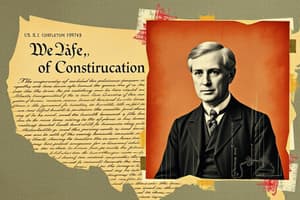Podcast
Questions and Answers
What primary responsibility does the Legislative branch hold?
What primary responsibility does the Legislative branch hold?
- Vetoing laws
- Interpreting laws
- Enforcing laws
- Creating laws (correct)
Which of the following is true about impeachment proceedings in the House?
Which of the following is true about impeachment proceedings in the House?
- The House can initiate impeachment charges against federal officials. (correct)
- Only the Senate can initiate impeachment charges.
- No president has ever been impeached by the House.
- Impeachment charges can only be made by the Judiciary Committee.
What role does the Chief Justice of the Supreme Court play in an impeachment trial?
What role does the Chief Justice of the Supreme Court play in an impeachment trial?
- Collects evidence against the official
- Votes to impeach
- Writes the impeachment articles
- Presides over the trial (correct)
Which action can only be taken by the Senate after an impeachment by the House?
Which action can only be taken by the Senate after an impeachment by the House?
Which of the following statements is false regarding the power of impeachment?
Which of the following statements is false regarding the power of impeachment?
What must occur for a presidential appointment to be confirmed?
What must occur for a presidential appointment to be confirmed?
What is true about the impeachment process in relation to federal judges?
What is true about the impeachment process in relation to federal judges?
Which of the following accurately describes the functions of the two houses of Congress?
Which of the following accurately describes the functions of the two houses of Congress?
Which power does Congress NOT possess?
Which power does Congress NOT possess?
What is the first step for a bill to become a law?
What is the first step for a bill to become a law?
What role does the Conference Committee play in the legislative process?
What role does the Conference Committee play in the legislative process?
If the president does not sign a bill within 10 days, what happens?
If the president does not sign a bill within 10 days, what happens?
Which entity has the authority to override a presidential veto?
Which entity has the authority to override a presidential veto?
What must happen after a bill passes both the House and Senate if there are different versions?
What must happen after a bill passes both the House and Senate if there are different versions?
What are committees responsible for in the context of reviewing bills?
What are committees responsible for in the context of reviewing bills?
Which of the following powers is specifically limited to a term of two years?
Which of the following powers is specifically limited to a term of two years?
Study Notes
Legislative Branch Overview
- The Legislative branch is responsible for creating laws in the U.S. and is outlined in Article I of the Constitution.
- Composed of two houses: the House of Representatives and the Senate.
- Key responsibilities: passing laws, declaring war, levying taxes, and holding impeachment powers.
Impeachment Process
- Congress has the sole power of impeachment; initiated by the House of Representatives.
- The House can initiate impeachment charges through a resolution or individual bills.
- The Judiciary Committee assesses whether to pursue impeachment; if approved, articles are sent to the House for a vote.
- If the House adopts articles of impeachment, members act as prosecutors in the Senate trial.
- Over 60 impeachment proceedings have occurred, with eight officials removed—none were presidents.
- Presidents impeached but not removed include Andrew Johnson, Bill Clinton, and Donald Trump.
Senate Duties
- The Senate confirms presidential appointments, including Supreme Court justices and cabinet members.
- Only the Senate can conduct impeachment trials, with the Chief Justice presiding during a presidential trial.
- A two-thirds Senate vote is required to remove an official from office.
Joint Powers of Congress
- Both houses must cooperate on multiple legislative duties, including:
- Laying and collecting taxes
- Borrowing money
- Regulating commerce
- Establishing naturalization rules
- Coining money and regulating its value
- Establishing post offices
- Declaring war
- Raising and maintaining armies without long-term funding commitments
- Providing for the militia
Legislative Process
- Only Congressional members can introduce legislation; the president can request legislation.
- Introduced bills go to committees for review; the House has 23 committees, the Senate 17.
- A bill must pass through subcommittees and committees before reaching the House or Senate floor for a vote.
- Differences in bills passed by each house lead to the formation of a Conference Committee for reconciliation.
- Once both houses agree on a final version, the bill is sent to the president for signature.
- The president can veto, return, take no action, or sign the bill. If unsigned for 10 days, the bill becomes law automatically.
- Congress can override a presidential veto with a two-thirds majority vote.
Studying That Suits You
Use AI to generate personalized quizzes and flashcards to suit your learning preferences.
Description
Explore the foundations of the Legislative branch established under Article I of the U.S. Constitution. This quiz covers the roles and responsibilities of Congress, including law-making, impeachment, and taxation. Test your knowledge on the crucial functions of the House of Representatives and the Senate.




